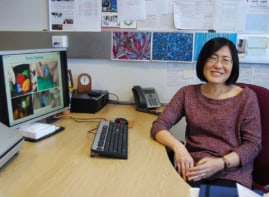
The world’s biggest computer-chip maker, Intel Corporation, has signed a major agreement with Dutch lithography firm ASML Holding to collaborate on developing the next generation of technology for manufacturing semiconductor chips. Under the terms of the deal, US firm Intel will take a 15% stake in ASML for around €2.5bn and will contribute €829m towards ASML’s research and development in new lithography-based chip-manufacturing systems.
Wafer etching
Chip manufacturers currently use production systems based on deep-ultraviolet lithography, which focuses light through lenses to etch circuit patterns onto silicon wafers. While this technology is limited to wavelengths of 193 nm, ASML is developing extreme ultraviolet (EUV) production systems that use light with wavelengths of just 20 nm. ASML says the new technology will enable chip makers “to deliver smaller, faster, cheaper and lower-power devices through smaller geometries on advanced manufacturing nodes”.
Chip makers currently produce chips on 300 mm silicon wafers but ASML is developing a system that can make chips on 450 mm-diameter wafers, which the firm says would basically double the capacity of chip-making factories at only a fraction of the cost. Brian Krzanich, Intel’s chief operating officer, says the firm’s investment could result in 450 mm prototypes as early as 2015, noting that in the past transitions to bigger wafers have helped to cut costs by 30–40%.
Next-generation chips
Jörg Stephan, project manager and research co-ordinator for the Berlin-based Fraunhofer Group for Microelectronics, says that Intel’s decision to invest in ASML is a boost for near-term development of EUV technology, which some experts previously thought would not be ready for the next generation of chip-making technology. “Intel is saying it believes in this technology,” he adds. “It is really new but also really expensive. It is not something that a research institute could buy and use in the laboratory.”
ASML says it is also in discussions with Samsung and the Taiwan Semiconductor Manufacturing Company about a stake in the firm. If those two companies agree to participate, their stakes combined with Intel’s could total a 25% share of ASML.



